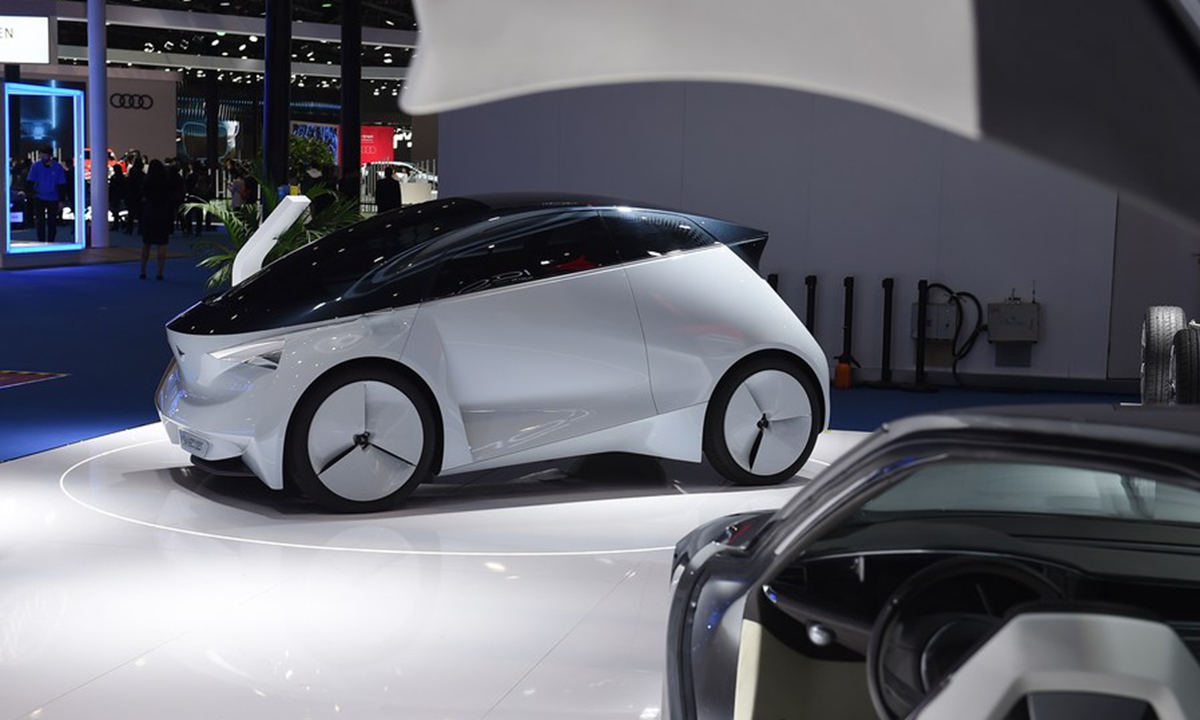CIIE attendees warming up for Biden win
By GT staff reporters Source: Global Times Published: 2020/11/9 19:43:40

Photo taken on Nov. 5, 2020 shows a concept car at the Automobile exhibition area during the CIIE in Shanghai, east China. (Xinhua/Zhao Dingzhe)
Hopes are running high among multinationals at the third China International Import Expo (CIIE), after Democrat Joe Biden reportedly won the US presidential election, as companies anticipate China-US trade and economic cooperation could get back on track.
As financial markets around the world received a marked boost in the wake of Biden's election showing, with the Chinese stock market rising 1.86 percent on Monday and Japanese stocks reaching a 29-year high, representatives of multinational companies attending the CIIE also expressed hopes for broader China-US economic cooperation in the post-Trump era.
The Trump administration's tariffs and trade protectionism have disrupted the global supply chain and severely undermined trust among nations. Trump's high tariffs were resisted by as many as 3,500 US companies including big names such as Tesla Inc and Home Depot, Reuters reported in September.
Jeffrey Kucik, an associate professor at the University of Arizona, wrote in an article in The Hill in August that US President Donald Trump's tariff policy also failed to bring back jobs to the US.
Li Yong, deputy chairman of the Expert Committee of the China Association of International Trade, expected that Biden will at least erase some of the tariffs imposed by Trump as tariffs are toxic to the US economy.
"The tariffs are not helping US manufacturing anyway, so I think there is a high chance that Biden drops at least part of Trump's tariffs, if not all," said Li.
"Under certain circumstances, Biden might choose to work with China on issues of common interest, which could possibly be a chance to lead China and the US onto the path of rational dialogue and improving ties," Li told the Global Times on Monday.
Companies attending the CIIE also said they yearned for a more stable global political situation, under a Biden administration.
An employee from a Swiss luxury group said while there has been no concrete and direct harm to the company's business from the China-US friction, there will still be a negative influence if China-US relations deteriorate.
"For example, the friction might lead to a gloomy stock market and this will make people less financially able to buy products. So companies like us do yearn for a stable global political situation," the employee told the Global Times, on condition of anonymity.
Some exhibitors also noted that the China-US friction has led to stronger volatility of the US dollar, which has hurt their business.
For US companies, their commitment to China's vast market remain unchanged, and they expect a higher degree of cooperation in the near future.
Julian Blissett, president of GM China, said the US carmaker will upgrade its cooperation with supply chains based in China and actively push its new-energy vehicles (NEVs) into the Chinese market, the world's largest auto market.
"We will localize almost all of the supply chain in China. Those cars will be made to be sold in China," Blissett told the Global Times during the CIIE, noting that 40 percent of GM's new car launches in the Chinese market will be battery electric vehicles in the next five years.
US biopharmaceutical company Pfizer is also using the platform of the CIIE to deepen collaboration with Chinese medical institutions and domestic biopharmaceutical companies to become an important part of China's medical and health system.
"We will continue to accelerate the introduction of innovative drugs and vaccines to the Chinese market, the world's second-largest pharmaceutical market and Pfizer's second-largest market," Wu Kun, China chief operating officer, Pfizer Biopharma Group told the Global Times.
Pfizer will also promote China's involvement in early international clinical research, and improve the accessibility of internationally advanced drugs and vaccine products by Chinese patients, Wu said.
Posted in: COMPANIES,BIZ FOCUS